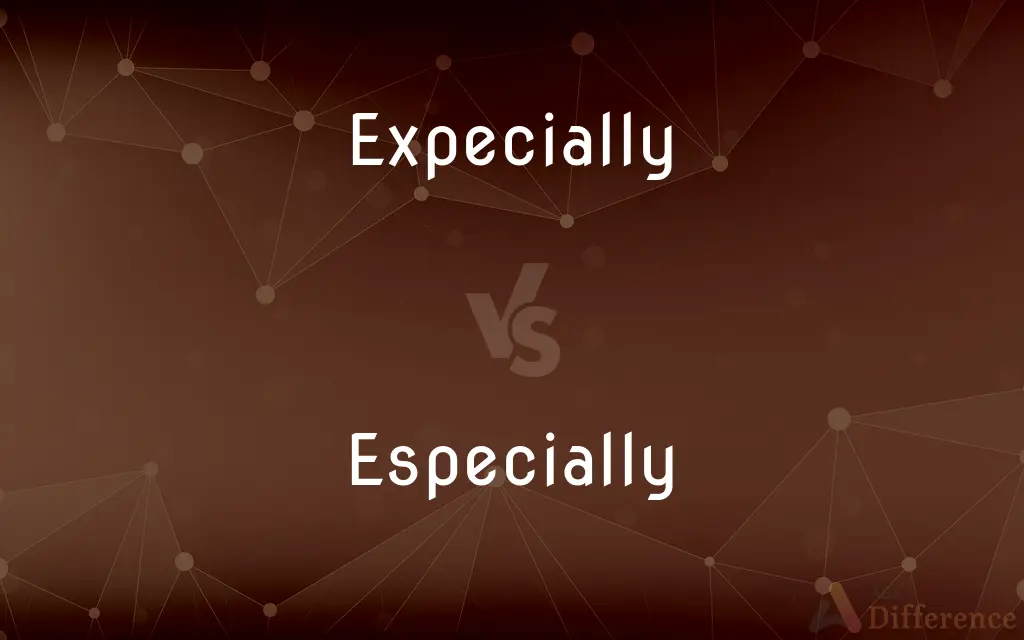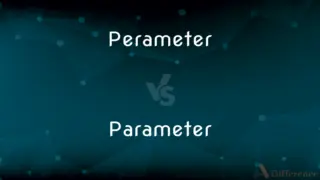Expecially vs. Especially — Which is Correct Spelling?
Edited by Tayyaba Rehman — By Fiza Rafique — Updated on April 1, 2024
"Expecially" is a common misspelling. The correct spelling is "especially," which means "particularly" or "above all."

Table of Contents
Which is correct: Expecially or Especially
How to spell Especially?

Expecially
Incorrect Spelling

Especially
Correct Spelling
ADVERTISEMENT
Key Differences
Think of the word "special" as the core of "especially."
Compare with similar words like "essential" or "espresso" which also start with "es-."
Correct pronunciation can guide correct spelling: "eh-specially," not "ex-specially."
Remember there's no "x" in "especially."
Associate "especially" with "essence" to remember the beginning "es-."
ADVERTISEMENT
How Do You Spell Especially Correctly?
Incorrect: The garden looks expecially beautiful in the spring.
Correct: The garden looks especially beautiful in the spring.
Incorrect: We need to arrive expecially early to get good seats.
Correct: We need to arrive especially early to get good seats.
Incorrect: My brother likes to eat expecially spicy food.
Correct: My brother likes to eat especially spicy food.
Incorrect: Expecially, I love the chocolate cake from that bakery.
Correct: Especially, I love the chocolate cake from that bakery.
Incorrect: She always sings expecially loud during her shower.
Correct: She always sings especially loud during her shower.
Especially Definitions
Used to emphasize a particular situation.
The car is quite small, especially for a family.
To a great extent; very much.
I love chocolate, especially the dark kind.
Singling out one person, thing, or situation.
I enjoy all sports, especially basketball.
To an extent or degree deserving of special emphasis; particularly.
(manner) In a special manner; specially.
(focus) Particularly; to a greater extent than is normal.
(focus) Used to place greater emphasis upon someone or something.
Invite them all, especially Molly.
In an especial manner; chiefly; particularly; peculiarly; in an uncommon degree.
To a distinctly greater extent or degree than is common;
He was particularly fussy about spelling
A particularly gruesome attack
Under peculiarly tragic circumstances
An especially (or specially) cautious approach to the danger
In a special manner;
A specially arranged dinner
More with one person, thing, etc. than with others.
The job requires patience, especially with customers.
Above all.
Always be honest, especially with yourself.
Especially Meaning in a Sentence
My teacher said I did especially well on my test.
She was especially happy to see her grandparents.
He's talented, especially in drawing and painting.
I like ice cream, especially vanilla flavor.
The park is especially nice in autumn.
She's always kind, but she was especially so today.
I'm especially tired after the long trip.
The library is quiet, especially in the mornings.
He's fast, but she's especially faster.
That movie is especially popular among teenagers.
The city is beautiful, especially at night.
The flowers smell especially sweet today.
The cake was delicious, especially the chocolate layer.
The car runs well, especially after the tune-up.
The beach is peaceful, especially at sunrise.
I enjoy all seasons, especially fall.
The museum is free on Sundays, especially for kids.
The weather is nice, but it's especially warm today.
Our team did well, especially in the second half.
This book is especially interesting to history buffs.
This game is especially challenging for new players.
The stars are bright, especially away from city lights.
This subject is hard for everyone, especially beginners.
I need to focus, especially during the exam.
He appreciates all music, especially classical.
Especially Idioms & Phrases
Especially for you
Made or done with a particular person in mind.
I baked this cake especially for you because I know how much you love chocolate.
Common Curiosities
What is the root word of especially?
The root word is "special."
Which vowel is used before especially?
No specific vowel; depends on the context.
What is the singular form of especially?
Especially. It doesn't have a singular or plural form as it's an adverb.
What is the pronunciation of especially?
/ɪˈspɛʃ.əl.i/
Why is it called especially?
Derived from the word "special" with a prefix "es-" to emphasize particularity.
What is the verb form of especially?
"Especially" doesn't have a verb form; it's an adverb.
Which preposition is used with especially?
Not specific to "especially"; depends on context.
What is the plural form of especially?
Not applicable.
Which article is used with especially?
It doesn't typically use an article since it's an adverb.
Is especially a noun or adjective?
Neither; it's an adverb.
Is especially a negative or positive word?
Neutral; can be used in both positive and negative contexts.
Is especially a collective noun?
No.
Is especially an abstract noun?
No.
Is the word especially imperative?
No.
What is another term for especially?
Particularly.
Which conjunction is used with especially?
Not specific; depends on context.
Is especially a vowel or consonant?
"Especially" is a word, not a letter, so it contains both vowels and consonants.
What is the first form of especially?
Not applicable.
Is especially a countable noun?
No, it's an adverb.
What is a stressed syllable in especially?
The second syllable, "pe."
What part of speech is especially?
Adverb.
What is the opposite of especially?
Not especially or ordinarily.
What is the third form of especially?
Not applicable.
Is the especially term a metaphor?
No.
How many syllables are in especially?
Four syllables.
What is the second form of especially?
Not applicable.
Is especially an adverb?
Yes.
How do we divide especially into syllables?
Es-pe-cial-ly.
Which determiner is used with especially?
Not specific to "especially"; depends on context.
How is especially used in a sentence?
"I enjoy reading, especially mysteries."
Share Your Discovery

Previous Comparison
Perameter vs. Parameter
Next Comparison
Sorceror vs. SorcererAuthor Spotlight
Written by
Fiza RafiqueFiza Rafique is a skilled content writer at AskDifference.com, where she meticulously refines and enhances written pieces. Drawing from her vast editorial expertise, Fiza ensures clarity, accuracy, and precision in every article. Passionate about language, she continually seeks to elevate the quality of content for readers worldwide.
Edited by
Tayyaba RehmanTayyaba Rehman is a distinguished writer, currently serving as a primary contributor to askdifference.com. As a researcher in semantics and etymology, Tayyaba's passion for the complexity of languages and their distinctions has found a perfect home on the platform. Tayyaba delves into the intricacies of language, distinguishing between commonly confused words and phrases, thereby providing clarity for readers worldwide.







































